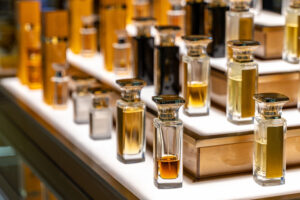The perfume world is full of creativity, luxury, and competition—but it’s also filled with confusion. If you’ve ever walked into a store or browsed online and seen perfumes labeled “similar to” or “inspired by” major luxury brands, you may have wondered: Is that even legal?
If you’re a brand owner—or an entrepreneur considering entering the fragrance industry—this article is for you. We’ll explore the fine line between fair competition and trademark infringement, and why protecting your brand is more important than ever.

🚨 The Rise of “Equivalent” Perfumes
Many companies in the U.S. market create and sell fragrances that mimic the scent profiles of iconic luxury perfumes. These “dupes” are often marketed using phrases like:
- “Inspired by [Brand]”
- “Equivalent to [Brand]”
- “Similar to [Brand]”
While these phrases may sound harmless, they walk a very thin legal line. Why? Because they rely on the reputation, identity, and goodwill of well-known trademarks—without permission.
🛑 When Is It Legal? When Is It Risky?
Under U.S. law, certain types of “comparative advertising” are allowed. Businesses can refer to another brand if it’s done truthfully and in a way that doesn’t mislead consumers. For example, it may be legal to say your product smells like a popular perfume—as long as:
- You clearly identify your own brand as the source.
- You don’t imply endorsement or affiliation with the original brand.
- You avoid using logos, distinctive packaging, or slogans that might confuse buyers.
- You include disclaimers like: “Not affiliated with [Brand].”
However, there are limits.
If the claims are exaggerated, deceptive, or suggest that your fragrance is an exact replica—especially when it’s not—you risk violating trademark law. This can lead to lawsuits, forced rebranding, and even financial penalties.
⚠️ Common Pitfalls for Perfume Startups
If you’re thinking about launching an “equivalent” perfume line, here are a few red flags to avoid:
- Misleading marketing. Claims like “100% identical” or “the same as” can trigger legal trouble.
- Poorly displayed disclaimers. Hiding your disclaimers in small print won’t protect you.
- Confusing packaging. Using bottle shapes, colors, or fonts that resemble well-known brands increases the likelihood of confusion.
- Inconsistent quality. Even if the scent is similar, differences in wear time or ingredients can make “equivalence” claims risky.
✅ The Importance of Trademark Protection
If you are a brand owner, protecting your trademark is essential to preserving your market position, reputation, and customer loyalty. Here’s why it matters:
- Prevents copycats from trading on your brand’s reputation.
- Creates legal leverage to stop infringing marketing or packaging.
- Builds brand value that can be licensed, franchised, or sold.
- Gives you exclusive rights to use your name and logo in your industry.
Even if your product isn’t patented (as is often the case with fragrances), your trademark still provides powerful protection against unfair competition.
🌍 What About Other Countries?
Trademark law is not the same everywhere—and if you’re planning to expand internationally, this matters. In the European Union, the Court of Justice of the EU (CJEU) has granted stronger protection to well-known trademarks. In some cases, even mentioning a famous third-party brand can be considered trademark infringement or unfair competition—regardless of whether the claim is truthful. Here, the rights of brand owners often take priority over the consumer’s right to information or a competitor’s right to market their products.
In contrast, the U.S. and the U.K. take a more flexible approach, generally allowing comparative advertising that is truthful, clear, and non-confusing. This legal environment favors consumer awareness and allows businesses more room to compete—as long as they don’t cross the line into deception or brand dilution.
🧠 Bottom Line: Compete with creativity, not confusion
Creating perfumes inspired by well-known brands can be legal in the U.S.—as long as your marketing is honest, transparent, and avoids misleading consumers. But this isn’t always the case globally.
For instance, in the European Union, courts take a much stricter view. Merely referencing a well-known trademark can be considered infringement, even when there is no confusion or false claim. This is a sharp contrast to the more flexible approach in places like the U.S. and U.K., where consumer rights and competitive freedom are more protected.
That’s why it’s so important to understand the legal boundaries of each market you operate in. Whether you’re launching locally or expanding abroad, investing in trademark protection and legal strategy doesn’t just protect your brand today—it lays the foundation for long-term, secure growth.
👋 Need Help Navigating the Trademark Landscape?
At Augusto Perera, P.A., we help fragrance companies and brand owners understand and enforce their rights. Whether you’re protecting your own identity or avoiding infringement pitfalls, we’ll guide you through the legal complexities with clarity and confidence.
📞 Call us at (305) 489-1901
📧 Email: ap@tmmiami.com
🌐 Visit: www.tmmiami.com
Secure your scent. Protect your brand.

